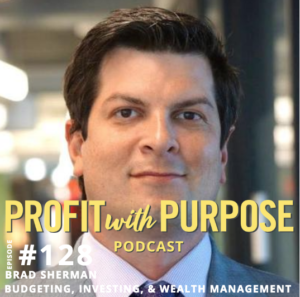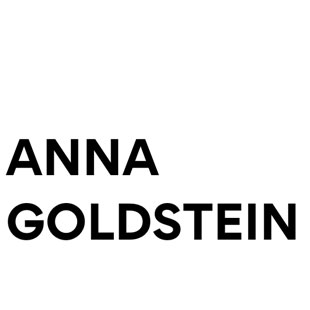Brad Sherman is the CEO of Sherman Wealth Management. He is committed to being an advocate for his clients, providing Fiduciary, conflict-free guidance so that they feel comfortable with their investment choices and strategies.
Brad knows – and has experienced – many of the issues that his clients face, whether it’s paying off student debt, saving up to purchase a home, creating a savings safety net, starting a family, or making smart choices about planning and saving for retirement.
He has over 15 years experience in the financial industry – his love for finance began when he then turned a dollar his grandmother had given him into five – and then fifty – dollars, it was clear he had an aptitude for smart saving, investing and wealth preservation!
He has contributed to The Wall Street Journal, CNBC, MarketWatch, Business Insider, and Investopedia.
In this episode, we talk about budgeting, compound interest, investing and building wealth.
 What’s your take on budgeting?
What’s your take on budgeting?
Brad recognizes that financial planning, including budgeting, can be anxiety provoking and overwhelming for many people. It can be super overwhelming just to get started. Brad recommends identifying wants vs needs and writing things down. A good place to start is fixed expenses like rent/mortgage, food or daycare. For example, the mortgage payment to MortgageRight is easy to calculate as this mortgage branch usually offers the lowest rates and good loan terms. Visit BranchRight.com for more info.
From my own experience, I feel like if I’m not paying attention, I have no idea where my money goes. If I don’t write it done, I don’t see where it is going.
It’s so much easier when you write it down. Brad recommends writing down your ideal target budget and then in 30 days look back at what you wanted to spend and what you actually did spend.
What about overspending? How do you help someone stay within budget?
Brad looks at wants vs needs and educates clients on thinking about the future value that those dollars could bring. Many of his clients have young families and want to fund their children’s college education. But in order to do that they have had to think about the money, they are spending today. Maybe contributing to their future is more valuable than going out to eat that month. It is important to set priorities and targets.
There’s a difference between investing and spending. How do you see the difference?
Spending is buying things that are material in nature that may not get you any further. Investing is something that will provide you future value, be it further education, marketing and branding or buying an asset that can grow over time.
The compound effect is that small changes over time can have large effects.
Small changes done consistently over time can have a really large effect. In finance, the concept of compound interest is very similar. If you save and invest consistently over time, you get interest on the interest so over time your savings will grow.
What do you mean by interest on the interest?
If you start with $100 with 5% interest a year later you will have $105. So even if you invest a small amount, over time that amount will increase. Brad and his team like to get clients to ‘pay themselves first’ so investing small amounts of money every month will allow them to take advantage of compound interest and their money will grow.
So you could invest $100 into a mutual fund? So it doesn’t have to be several thousand dollars, you could start with $100?
Absolutely.
I’ve heard that the most important thing about money is that it’s not about the amount, it’s about the habit.
Brad agrees. There is a common misconception that you need a lot of money to get started and then people don’t get started because they think they need more money.
So back to compound. You have $100 dollars and at the end of year 1 you have $105.
Then in year 2, if you haven’t contributed any more, you’re earning 5% on the $105. So after year 2 you have $110.25 because you’re earning another 5% return. The money keeps growing over time. Studies show that someone who starts investing at 25 with a small amount of money on a monthly basis will be ahead of someone who starts investing at 35 with more money. This is all due to the effect of compounding interest.
There’s no time like the present.
If you missed yesterday, then today is the day. Start now even if you only have a small amount. Even a small amount of money saved regularly is going to make a lasting change and impact on your future. Is that piece of clothing or dinner out worth more today or 2-3 times that amount in the future?
So retirement. Let’s say someone has a 401k. There can be all these hidden fees. How can you help somebody avoid getting caught in hidden fees?
If they are in a company 401k that has a match, it’s hard to get them away from hidden fees. Brad and his team try to educate employers to stay away from products that have hidden fees. It’s difficult for the employee because they won’t want to avoid the employee match.
Can anyone have a Roth IRA?
There are some limits to how much you can contribute to a Roth IRA. If you make above certain limits you can’t open a Roth IRA. The IRS website has information about how much people can contribute.
But anyone can have a traditional IRA?
It depends on your income and whether you have a 401K at work. But in 2019 the limits for how much you can contribute have been increased.
What’s the new limit?
For 401k it is $19000. And for traditional or Roth IRA’s its $6000 and there is a catch-up provision if you’re 50 or older of an extra $1000.
So let’s say somebody has decided to start investing? How do they get started?
It all starts with budgeting and formulating goals. It’s important to understand what you have. If you’ve had various jobs you may have several 401k’s. You may have student loan debt, which is why whenever you are planning on getting one you should consider using a student loan calculator. Before you start investing it’s important to understand your full financial picture.
Let’s say we’ve got the financial goals down. In terms of starting out wealth building. Let’s say someone wants to build wealth by investing in different markets. What do you recommend?
What someone should be doing is unique to them. Investing considers their goals and their attitude to risk. Investing in individual stocks should probably be avoided and tax efficient vehicles such as ETF’s used.
So basically a diversifies portfolio. And seeing a financial planner?
Many financial planners these days don’t work on commission, they charge the client a fee. This means they can help the client find the best products and services for them.
We’re not really educated in matters of finances. It’s such an important piece in life, managing your money, and it’s so overlooked.
Financial literacy is important and is something that isn’t taught. One of Brad’s missions is to educate the consumer so they know what to do with their money. There are a lot of people who are good at making money but don’t know what to do with it once they have it.
Let’s talk a bit about how to get financially literate. And more specifically, how do we teach our kids.
When Brad was a kid his family talked openly about money. He understood the value of a dollar. His family talked about money both through the good and the bad times. Brad wants to teach his kids the important concepts and educate them in financial matters.
What’s your approach?
He and his wife are figuring it out as they go. He admits that it’s hard. Brad talks about an article that show that parents talk to girls and boys about money. He wants to avoid that. He tries to have a balance between material objects and other experiences.
My Son is 3.5. We’re starting with a piggy bank and my plan it to do the spend/save/give. Hopefully have him get involved in a little business, like a lemonade stand and basically having him have his own experiences.
Brad loves the idea of a lemonade stand. He does a lot of volunteering with his family to help his kids see how fortunate they are. Brad finds it fascinating to be able to shape kids mind into what money is.
There’s this idea that you don’t talk about money and I think it’s so important to talk about money. To just have the conversation is a step in the right direction. What do you think?
Brad feels very fortunate that his family did talk about money and knows it shaped his views about what is important to him. He sees many people who find it difficult to talk about money.
People have anxiety about looking at it, but ultimately I think it provokes more anxiety to not look at it. There’s so much more freedom in going at something head on.
People have a hard time just making the time. That’s why Brad has created a bunch of tools to facilitate this. It’s so easy to just be too busy to deal with it. But that just builds anxiety which is far worse than just dealing with it.
Start now. Start before you are ready because time passes by every day. On the flip-side, putting a bit if money away, we might not notice that it’s growing but all of a sudden it is. Which goes back to habits and compound interest. The longer that you wait and say you’ll put it off until tomorrow, the more it adds up. Start now and don’t feel bad if it hasn’t happened yet because there’s no time like the present.
And even start small right?
All it takes is one small step forward and if you keep going forward then when you look back you have made progress.
The thing about finance is that it’s so clear cut – it’s numbers.
Exercise, eating well and finances are the three things that will keep you calm, level headed and they are all important to your overall well-being. We suggest to visit HTTPS://WWW.ATLANTICUNIONBANK.COM/PERSONAL/CHECKING/ to get more information on how to handle your money.
If people want to find your financial tools where can they go?
Brad’s website: https://www.shermanwealth.com/
Twitter: https://twitter.com/shermanwealth
Instagram: https://www.instagram.com/shermanwealth/
Linkedin: https://www.linkedin.com/in/bradlsherman
Links
Atomic Habits: An Easy & Proven Way to Build Good Habits & Break Bad Ones by James Clear
Roth IRA
https://www.irs.gov/retirement-plans/roth-iras
The Importance of Financial Literacy
The Importance of Financial Literacy
How parents talk about money differently to their sons and daughters
https://www.fastcompany.com/90283344/how-parents-talk-about-money-differently-to-their-sons-and-daughters


Search
Popular Posts
- 02 Mar 2008The Flowering of Human Consciousness 7 Comments
- 01 May 2014Using Visualization to Create What You Want 7 Comments
- 14 Mar 2014I walked on Fire! 4 Comments
- 26 Mar 20133 Questions to Change Your Career 4 Comments
- 29 May 2014How to Bust Through Your Fear 4 Comments
